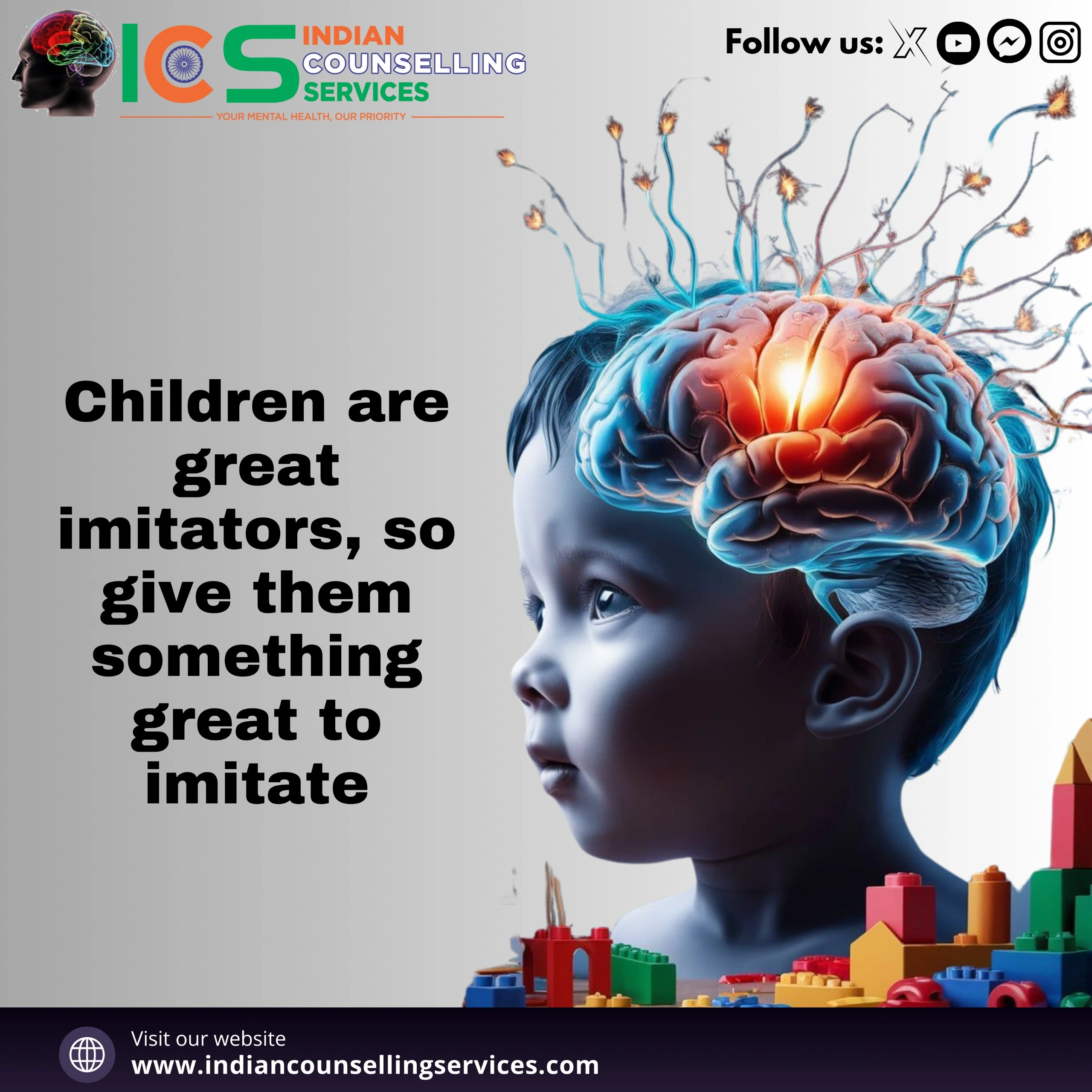
Children Are Great Imitators: So Give Them Something Great to Imitate
The saying, “Children Are Great Imitators, so give them something great to imitate,” encapsulates a powerful truth about child development. Children are naturally inclined to observe and mimic the behaviors, attitudes, and emotions of the adults around them. This capacity for imitation shapes their understanding of the world and influences their future behaviors, beliefs, and values. As caregivers, educators, and role models, our responsibility is to be mindful of the example we set, ensuring that we provide children with positive behaviors and values to emulate.
In this blog post, we will explore the significance of imitation in child development, the impact of adult behavior on children, and practical strategies for being a positive role model.

The Role of Imitation in Child Development: Children Are Great Imitators
Children begin to learn through observation from the moment they enter the world. Research in developmental psychology highlights that children learn by watching others, Children Are Great Imitators, particularly those they admire. This learning occurs in various contexts, including the home, school, and community. According to psychologist Albert Bandura, much of human behavior is learned through imitation, highlighting the importance of role models in shaping children’s actions and beliefs.
Imitation goes beyond simply copying what they see; it involves a complex process that includes several cognitive steps:
- Attention: Children need to pay attention to a behavior before they can imitate it. They are drawn to behaviors that are interesting, engaging, or performed by someone they respect, such as a parent or teacher.
- Retention: Once they have observed a behavior, children must retain it in their memory. This means that they are not only watching but also encoding the information for future use.
- Reproduction: After retaining the observed behavior, children will attempt to reproduce it. They may practice the behavior in various settings until they feel comfortable with it.
- Motivation: For children to imitate a behavior, they must be motivated to do so. This motivation can stem from seeing someone receive praise or approval for a behavior, leading them to want to achieve the same recognition.
This process shows that children are not mere imitators; they actively engage with what they see and choose which behaviors to adopt based on their observations.
Given that children are constantly observing, we must consider what we are teaching them through our actions and words. Are we modeling positive behaviors, or are we inadvertently teaching them negative ones?
Here are a few areas where adult behaviors significantly impact children’s learning:
- Emotional Management: Children learn how to handle their emotions by watching how adults respond to stress, anger, and frustration. If they see adults reacting calmly and constructively, they are likely to adopt similar approaches. Children Are Great Imitators, Conversely, witnessing emotional outbursts or negative coping mechanisms may lead them to mimic those behaviors.
- Communication Styles: The way adults communicate with each other and with children serves as a blueprint for effective communication. If children observe respectful and open dialogue, they are more likely to practice those same communication skills. However, exposure to harsh or dismissive communication can lead to poor interaction patterns in their relationships.
- Conflict Resolution: Children learn how to resolve conflicts by observing adults. If they see adults negotiating and finding solutions, they will be more inclined to adopt these strategies. In contrast, if they witness avoidance or aggression, they may develop unhealthy approaches to conflict.
- Ethical and Moral Values: Children learn about right and wrong primarily through observation. When they see adults exhibiting honesty, fairness, and empathy, they internalize those values. Conversely, witnessing unethical behavior can send mixed messages about what is acceptable.
To give children something valuable to imitate, we must first examine our own behaviors and attitudes. Here are some practical strategies for being a positive role model:
- Align Words and Actions: It’s essential to practice what you preach. Children can easily detect discrepancies between what you say and how you act. For instance, if you emphasize kindness but often speak negatively about others, children will likely adopt the behavior they observe rather than the values you articulate.
- Demonstrate Emotional Intelligence: Show children how to manage their emotions effectively. When you experience frustration or sadness, model healthy coping mechanisms such as deep breathing or discussing feelings. This teaches children that it’s okay to express emotions while also finding constructive ways to handle them.
- Encourage Empathy: Modeling empathy is crucial for children’s social development. Demonstrate kindness in everyday interactions, whether with family, friends, or strangers. Encourage children to express their feelings and consider the feelings of others, fostering a culture of compassion and understanding.
- Promote a Growth Mindset: Help children learn that failure is a part of life. When you face challenges, show resilience and a willingness to learn from mistakes. Let children see that setbacks can be opportunities for growth, and encourage them to adopt the same mindset.
- Mindful Communication: Be aware of how you communicate about others. Use language that is respectful and constructive, even when discussing difficult topics. Children learn from what they hear, and positive language will influence their own communication styles.
- Take Responsibility: Show accountability for your actions. When mistakes happen, acknowledge them and apologize if necessary. This teaches children the importance of taking responsibility and learning from their experiences.
- Create a Supportive Environment: Foster an environment that encourages curiosity and learning. Provide opportunities for exploration and creativity, and celebrate children’s efforts and achievements. When children feel supported, they are more likely to imitate positive behaviors.
The Ripple Effect of Positive Imitation: Children Are Great Imitators
The impact of modeling positive behaviors extends beyond individual children; it creates a ripple effect within communities and society as a whole. When children learn positive behaviors from their parents and teachers, they carry those lessons into their interactions with peers and future generations.
As these children grow into adults, they influence others, perpetuating a culture of empathy, respect, and kindness. By giving children something great to imitate, we contribute to a better society where positive values are upheld.
Children are constantly learning from their environment, and as adults, we have the unique opportunity to shape that environment. The responsibility of being a role model is significant, but it is also a chance to make a lasting impact.
By being mindful of our actions, demonstrating positive behaviors, and instilling values of kindness, empathy, and resilience, we give children the tools they need to navigate the world positively. In doing so, we ensure that the next generation is equipped to create a brighter, more compassionate future for all.
Ultimately, by embracing our role as positive role models, we empower children to become the best versions of themselves, enriching not only their lives but also the lives of those around them.

2 Comments
What to Expect from a Diploma in Psychotherapy Program - indiancounsellingservices.in
October 25, 2024[…] curriculum for a Diploma in Psychotherapy typically encompasses a wide range of subjects designed to provide a solid foundation in […]
Building Rapport with Psychologist - Indian Counselling Services
November 12, 2024[…] you feel understood and respected by your psychologist, therapy sessions become more engaging and rewarding. A strong connection can enhance your motivation to show up consistently, do the work, and stay […]